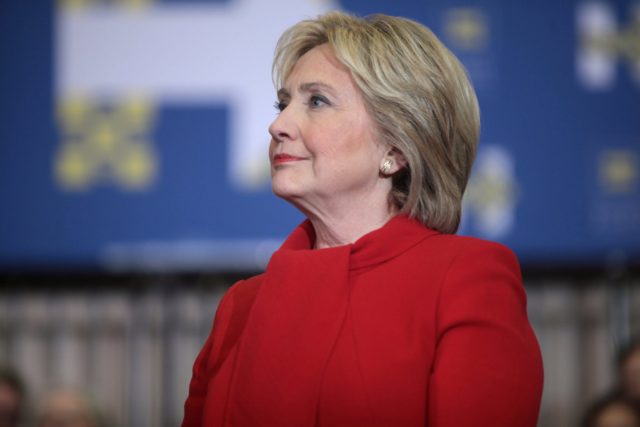
Judge blocks Durham evidence of Clinton camp’s ties to Trump-Russia claims Former Secretary of State Hillary Clinton speaking with supporters. (Gage Skidmore/Flickr)
A federal judge blocked special counsel John Durham over the weekend from introducing evidence in court linking Hillary Clinton’s 2016 presidential campaign to efforts to harm then-candidate Donald Trump’s campaign by alleging he held ties to the Russian government.
On Saturday, D.C. U.S. District Judge Christopher Cooper ruled against Durham’s efforts to introduce several pieces of evidence potentially implicating Clinton in a case against attorney Michael Sussman. The attorney is currently charged with lying to FBI lawyer James Baker by concealing his ties to the Clinton campaign when he handed the agency data in September 2016 purporting to show a secret communication channel between Trump’s campaign and a Russian bank, Alfa Bank.
Durham’s office claimed the evidence shows Sussman, who represented the 2016 Clinton campaign, was working as part of a broader Clinton campaign effort “toward a common goal” of promoting negative narratives about Trump. Durham specifically requested to bring communications records and other documents connecting Sussman with a technology executive named Rodney Joffe, the Clinton Campaign, Clinton campaign lawyer Marc Elias and Fusion GPS — an investigative firm retained by Elias.
Cooper, who was appointed by President Barack Obama, ruled the evidence Durham was trying to introduce would “essentially amount to a second trial” for conspiracy — a crime Durham has not charged in his current case against Sussman.
In his ruling, Cooper said court rules do allow prosecutors to introduce evidence of co-conspirators in cases “even if the defendant is not formally charged with any conspiracy in the indictment” but said, “when the relevant conspiracy is uncharged, extensive presentation of evidence about that conspiracy is likely to confuse the jury and distract from the issues at hand.”
Cooper also wrote that “while the special counsel has proffered some evidence of a collective effort to disseminate the purported link between Trump and Alfa Bank to the press and others, the contours of this venture and its participants are not entirely obvious.”
Durham had argued the evidence would show Sussman coordinating with various other individuals linked to the Clinton campaign to promote claims of collusion between Trump’s campaign and Russia. Durham said Sussman’s alleged desire to conceal the Clinton campaign’s ties to this effort “supplied a motive for him to misrepresent to Mr. Baker that he was not providing the data to the FBI on behalf of any client.”
In response, Cooper wrote “the Court gleans from various of the defense’s pleadings and arguments, its case will be that Mr. Joffe obtained and analyzed the relevant data independently of Mr. Sussmann and the Clinton Campaign; that Mr. Joffe enlisted the defendant, with whom he [had] a preexisting attorney-client relationship, for legal advice on how to handle and disseminate the data to a wider audience; that Mr. Sussmann reasonably believed, based on the understanding of the data that he gained from Mr. Joffe, that it tended to support the existence of a communications link between Alfa Bank and Mr. Trump; that Mr. Sussmann and Mr. Joffe
shared the view that bringing the potential communications channel to the FBI’s attention was important to protect national security, regardless of any political implications; and that Mr. Sussmann sought an audience with Mr. Baker for that purpose.”
Cooper did say an email between Joffe and computer researchers working at his direction — in which he said “the VIPs would be happy” if they could find anything linking Trump to Russia — could be admissible in court.
Cooper said he will also allow Durham’s team to question witnesses about how technology researchers studied links in so-called Domain Network Service (DNS) data between Trump Tower and Alfa Bank.




